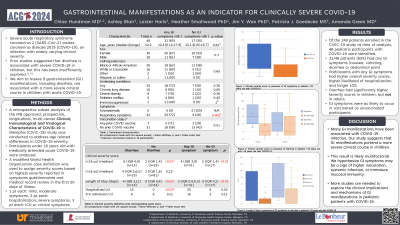Sunday Poster Session
Category: Pediatrics
P1468 - Gastrointestinal Manifestations as an Indicator for Clinically Severe COVID-19
Sunday, October 27, 2024
3:30 PM - 7:00 PM ET
Location: Exhibit Hall E

Has Audio

Chloe Hundman, MD
University of Tennessee Health Science Center
Memphis, TN
Presenting Author(s)
Chloe Hundman, MD1, Heather S. Smallwood, PhD1, Jim Y. Wan, PhD1, Patricia J. Goedecke, MS1, Amanda Green, MD2
1University of Tennessee Health Science Center, Memphis, TN; 2St. Jude Children's Research Hospital, Memphis, TN
Introduction: Severe acute respiratory syndrome coronavirus 2 (SARS-CoV-2) causes coronavirus disease 2019 (COVID-19), an infection with widely varying clinical severity. Prior studies suggested that diarrhea is associated with severe COVID-19 in children, but this has been insufficiently explored. We aim to assess if gastrointestinal (GI) manifestations, including diarrhea, are associated with a more severe clinical course in children with acute COVID-19.
Methods: A retrospective subset analysis of the IRB approved, prospective, longitudinal, multi-center Clinical, Immunological and Virological Characteristics of COVID-19 in Memphis (CIVIC-19) study was conducted to address age related differences in COVID-19 severity. Participants tested for SARS-CoV-2 were enrolled through outpatient and inpatient sites. Participants under 18 with medically attended acute COVID-19 were analyzed. A modified World Health Organization case definition was used to assign severity scores based on highest severity reported in symptoms questionnaires and medical record review in the first 30 days of illness. GI and other presenting symptoms were tracked.
Results: Of the 249 patients enrolled in the CIVIC-19 study at time of analysis, 48 pediatric participants with COVID-19 were identified. The median age was 12.2 years. 31 of the 48 patients (65%) had GI symptoms including nausea, vomiting, diarrhea or abdominal pain. 15 of 48 (31%) had diarrhea. Pediatric participants with GI symptoms had significantly higher severity scores (median of 4 [IQR 3,9]) compared to those without (median of 2 [IQR 1,4],p< 0.01). Pediatric participants with diarrhea were significantly more likely to have severe COVID-19 (median score of 6 [IQR 4,9],p < 0.01). Those with GI symptoms were more likely to be hospitalized and have longer lengths of hospital stay, but were not more likely to be admitted to the ICU (Table 1). Notably, adults with COVID-19 did not show a difference in severity score for those with and without diarrhea (p=0.21).
Discussion: Many GI manifestations have been associated with COVID-19 infection. Our study suggests that GI manifestations portend a more severe clinical course in children. This result is likely multifactorial. We hypothesize GI symptoms may be a sign of higher inoculation, systemic infection, or immature mucosal immunity. More studies are needed to explore the clinical implications and mechanisms of GI manifestations in pediatric patients with COVID-19.
Note: The table for this abstract can be viewed in the ePoster Gallery section of the ACG 2024 ePoster Site or in The American Journal of Gastroenterology's abstract supplement issue, both of which will be available starting October 27, 2024.
Disclosures:
Chloe Hundman, MD1, Heather S. Smallwood, PhD1, Jim Y. Wan, PhD1, Patricia J. Goedecke, MS1, Amanda Green, MD2. P1468 - Gastrointestinal Manifestations as an Indicator for Clinically Severe COVID-19, ACG 2024 Annual Scientific Meeting Abstracts. Philadelphia, PA: American College of Gastroenterology.
1University of Tennessee Health Science Center, Memphis, TN; 2St. Jude Children's Research Hospital, Memphis, TN
Introduction: Severe acute respiratory syndrome coronavirus 2 (SARS-CoV-2) causes coronavirus disease 2019 (COVID-19), an infection with widely varying clinical severity. Prior studies suggested that diarrhea is associated with severe COVID-19 in children, but this has been insufficiently explored. We aim to assess if gastrointestinal (GI) manifestations, including diarrhea, are associated with a more severe clinical course in children with acute COVID-19.
Methods: A retrospective subset analysis of the IRB approved, prospective, longitudinal, multi-center Clinical, Immunological and Virological Characteristics of COVID-19 in Memphis (CIVIC-19) study was conducted to address age related differences in COVID-19 severity. Participants tested for SARS-CoV-2 were enrolled through outpatient and inpatient sites. Participants under 18 with medically attended acute COVID-19 were analyzed. A modified World Health Organization case definition was used to assign severity scores based on highest severity reported in symptoms questionnaires and medical record review in the first 30 days of illness. GI and other presenting symptoms were tracked.
Results: Of the 249 patients enrolled in the CIVIC-19 study at time of analysis, 48 pediatric participants with COVID-19 were identified. The median age was 12.2 years. 31 of the 48 patients (65%) had GI symptoms including nausea, vomiting, diarrhea or abdominal pain. 15 of 48 (31%) had diarrhea. Pediatric participants with GI symptoms had significantly higher severity scores (median of 4 [IQR 3,9]) compared to those without (median of 2 [IQR 1,4],p< 0.01). Pediatric participants with diarrhea were significantly more likely to have severe COVID-19 (median score of 6 [IQR 4,9],p < 0.01). Those with GI symptoms were more likely to be hospitalized and have longer lengths of hospital stay, but were not more likely to be admitted to the ICU (Table 1). Notably, adults with COVID-19 did not show a difference in severity score for those with and without diarrhea (p=0.21).
Discussion: Many GI manifestations have been associated with COVID-19 infection. Our study suggests that GI manifestations portend a more severe clinical course in children. This result is likely multifactorial. We hypothesize GI symptoms may be a sign of higher inoculation, systemic infection, or immature mucosal immunity. More studies are needed to explore the clinical implications and mechanisms of GI manifestations in pediatric patients with COVID-19.
Note: The table for this abstract can be viewed in the ePoster Gallery section of the ACG 2024 ePoster Site or in The American Journal of Gastroenterology's abstract supplement issue, both of which will be available starting October 27, 2024.
Disclosures:
Chloe Hundman indicated no relevant financial relationships.
Heather Smallwood indicated no relevant financial relationships.
Jim Wan indicated no relevant financial relationships.
Patricia Goedecke indicated no relevant financial relationships.
Amanda Green indicated no relevant financial relationships.
Chloe Hundman, MD1, Heather S. Smallwood, PhD1, Jim Y. Wan, PhD1, Patricia J. Goedecke, MS1, Amanda Green, MD2. P1468 - Gastrointestinal Manifestations as an Indicator for Clinically Severe COVID-19, ACG 2024 Annual Scientific Meeting Abstracts. Philadelphia, PA: American College of Gastroenterology.

